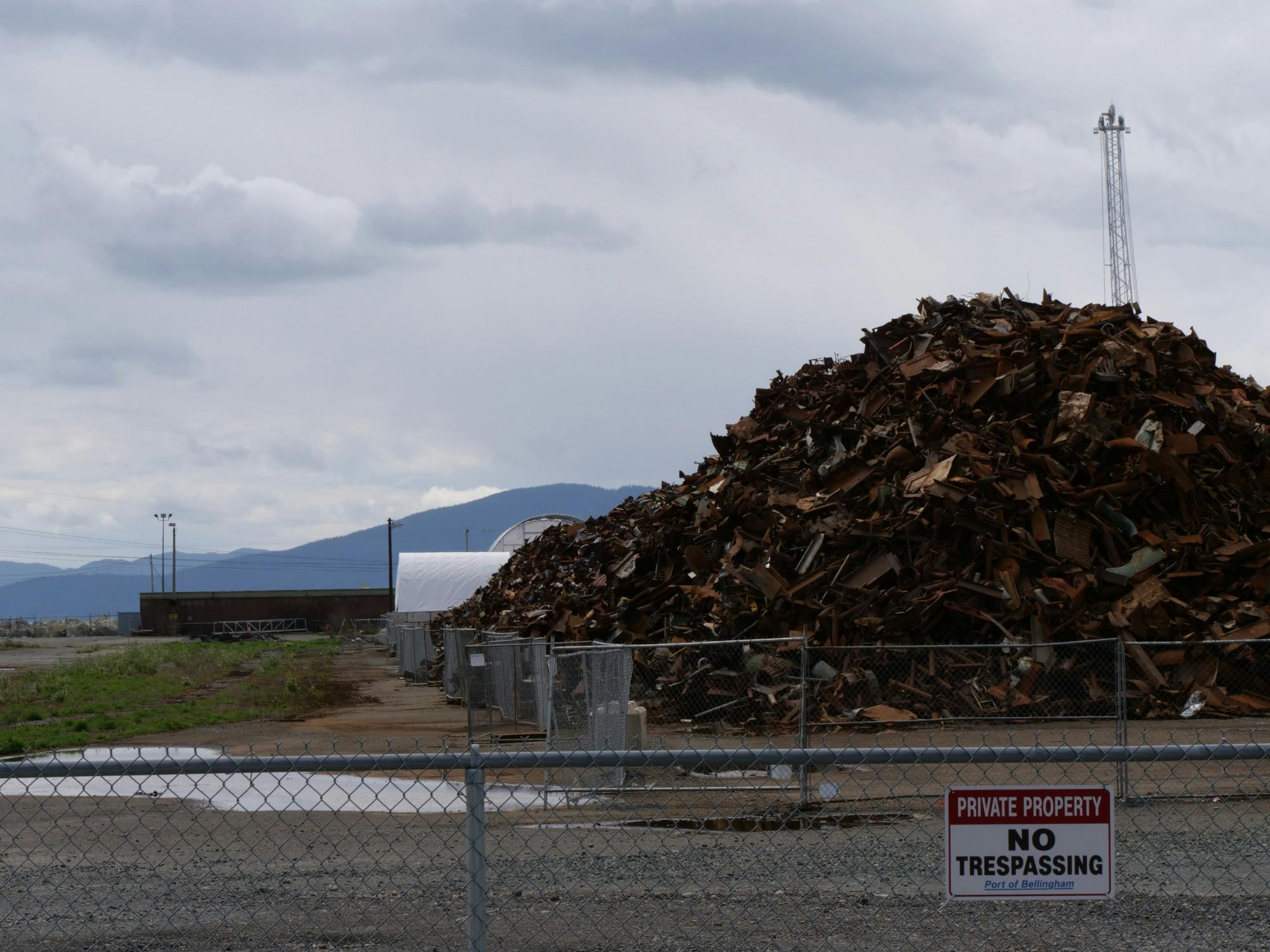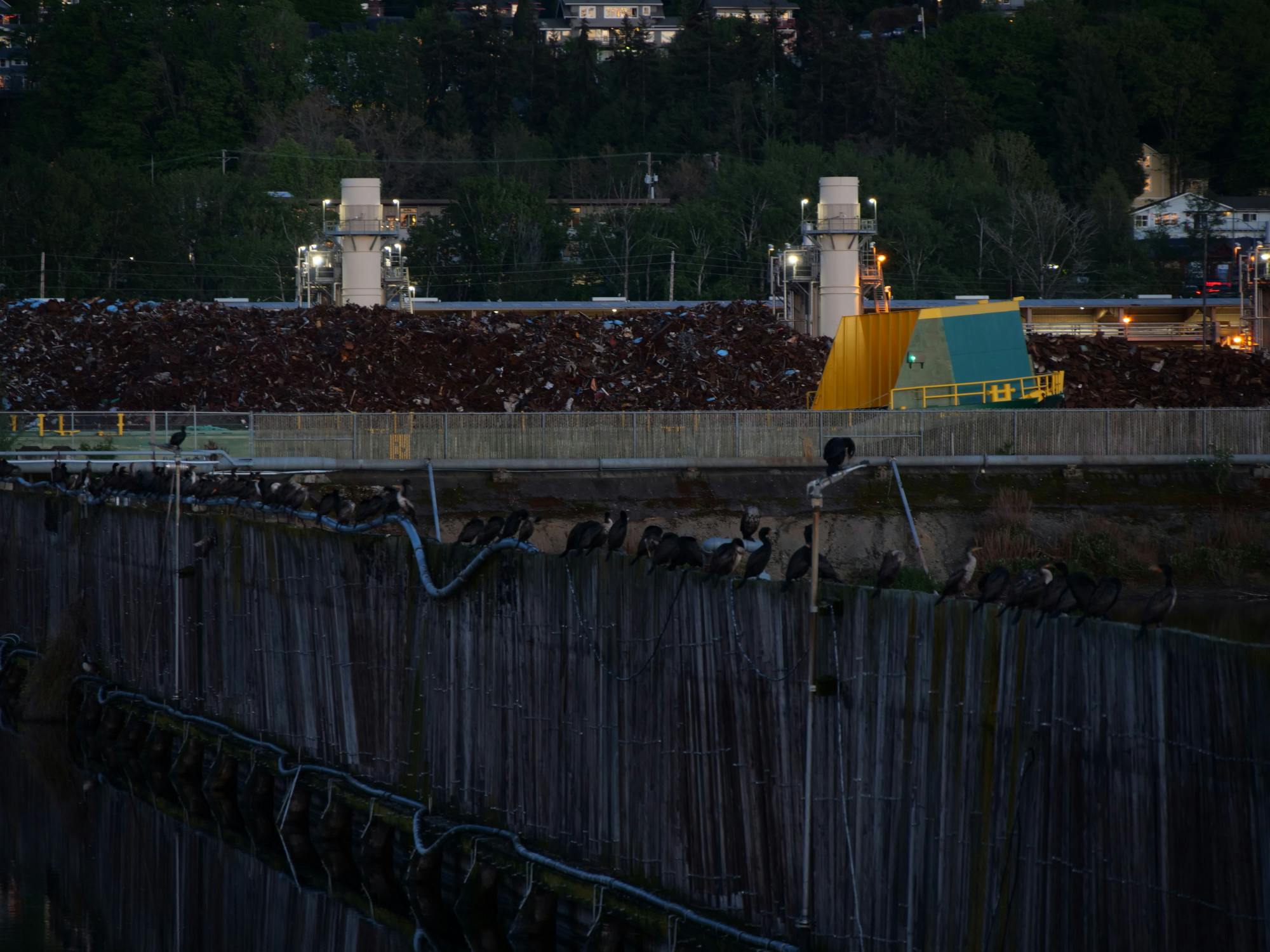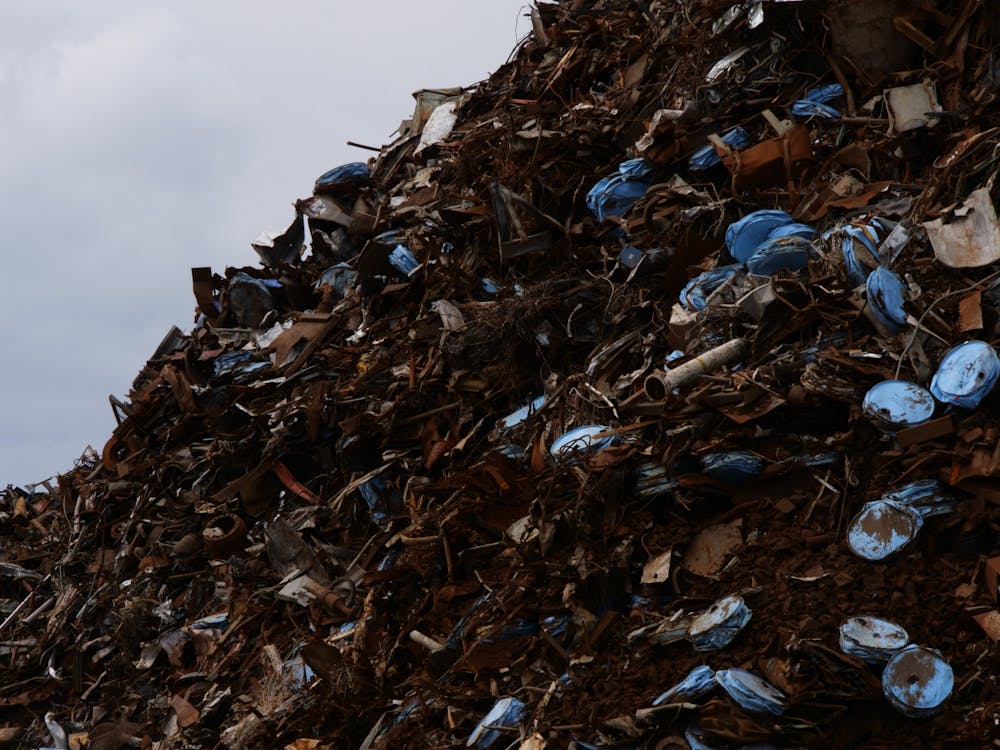The piles of scrap metal at the Bellingham waterfront are shrinking. In March, the Port of Bellingham terminated its lease with ABC Recycling due to allegations of environmental misconduct, giving ABC until June 30 to remove all scrap metal from the Port’s shipping terminal.
On April 30, ABC withdrew its application for a permit to build a metal shredder on Marine Drive. While ABC has not provided a reason for the withdrawal, the move comes after community concerns about the recycling company’s environmental stewardship.
“The reason for this termination is partially a story about a commitment to a clean environment,” said Bellingham’s District One Port Commissioner Michael Shepard. “I really do believe in a working waterfront in our community, but those industries have to be able to operate cleanly.”
ABC violated the terms of its lease by contributing to increased levels of heavy metals in stormwater readings, dropping scrap metal into the Whatcom Waterway and docking a ship in an unauthorized location, according to the Port.
“We saw numerous incidents where the stormwater readings were elevated for key metals that are tested and reported to the Department of Ecology,” Shepard said. “We also had documented situations of metal being dropped into the waterway while being loaded.”
ABC Recycling disputed the allegations of environmental misconduct. Additionally, Riley Sweeney, ABC Recycling’s community relations manager, said that recent environmental monitoring found no pollution indicators while ABC was loading scrap metal onto the Ken Spirit.
“RE Sources, our local environmentalists, were out there doing testing during our ship-loading and found everything within acceptable levels,” Sweeney said.
Kirsten McDade patrols the Salish Sea for RE Sources as their North Sound Waterkeeper, monitoring water quality and watching for pollution. In an email, she confirmed that she observed the metal transfer in a canoe for two hours on Friday, April 12.
“During the time we were out there, we did not detect any egregious water quality violations … Our metal detection is not very sophisticated, so I'm not sure we would be able to pick up on small amounts of metal pollution in such a large body of water,” McDade wrote.
McDade also said she didn’t see any metal dropped into the water while she observed the ship loading, but that she wasn’t present during previous metal transfers.
“The reason we know that metal had dropped into the water during previous transfers was that it was found [when] the waterway was dredged — it was scooped up with the sediment,” McDade wrote. “There were some modifications made to prevent this from happening again, including the dredging that allowed the ship to get closer to the dock.”

Scrap metal piles at ABC Recycling’s site on Cornwall Avenue in Bellingham, Wash., as seen from the Whatcom Waterway on April 9, 2024. The Port has ordered ABC to remove all scrap metal from the site by June 30. // Photo by Oren Roberts
McDade also provided a copy of the Port’s letter of default to ABC as evidence of prior pollution. In the letter, the Port gave the recycling company 30 days to comply with stormwater management requirements or vacate.
As of April 15, ABC had already removed about half of their scrap metal from the shipping terminal — approximately 27,000 metric tons, according to Sweeney.
“It is going to smelters in Bangladesh, where it will be melted down and turned into the construction materials of tomorrow,” Sweeney said.
The Shredder
When reached for comment, Sweeney declined to elaborate on ABC’s decision to scrap the shredder project on Marine Drive.
Sarah Gardner, a member of the Birchwood Neighborhood Board and an advocate with the Save the Waterfront Foundation, was concerned about the environmental risks of the project from the beginning.
“We have a very dense neighborhood next to the [proposed site for the] shredder,” said Gardner. “Metal shredders in and of themselves are very dangerous industries for the environment and the people around them.”
Scrap metal, which can include old cars and appliances, must be shredded to be recycled. According to Gardner, this releases fine particles that can contaminate the surrounding area with volatile organic compounds (VOCs) and heavy metals such as lead, copper and zinc.
“When the cars get shredded, all of that debris — including residue from paints, plastics and gasoline products — also goes up into that air and becomes a health hazard for people to breathe,” she said.
In April, Sweeney said ABC would address that concern by only shredding material that has already been “de-polluted” by a licensed scrapyard.
“So if it's a car, you've drained the fluids out, you've removed mercury switches or things that can't be shredded … You pull all that material out and then you squish the car so that it's ready for shredding. Same with appliances,” Sweeney said.

A Port of Bellingham “no trespassing” sign marks the edge of the shipping terminal site in Bellingham, Wash., on April 21, 2024. ABC’s lease there is set to end on or before September 30, 2024. // Photo by Oren Roberts
Louisa Keating is an urban planning major at Western who researches lead contamination from metal shredders under professor Troy Abel. She said the Birchwood and Alderwood neighborhoods are already disproportionately exposed to environmental hazards, as shown by Washington’s Environmental Health Disparities Map and the Justice 40 Map. She said the proposed shredder would have exacerbated those risks.
“We've seen, just based off of the Port's decision to terminate its lease with ABC, that ABC is not great at following environmental standards. Most industrial areas aren't,” Keating said.
Keating’s research looked at the environmental impacts of a different company’s shredder in Duwamish. There, the Washington Department of Ecology found in 2019 that the Seattle Iron and Metal Corporation had violated pollution limits on dozens of occasions.
“The Seattle metal shredder was polluting and letting high amounts of lead into the Duwamish River,” Keating said.
Paulina Lopez is the executive director of the Duwamish River Community Coalition. She said that in her community, life expectancies are already 13 years shorter than in other Seattle neighborhoods.
“As a community member, we have concerns about the lack of accountability from industries not bringing up the technology needed to protect a community already with so many health vulnerabilities and injustices,” she wrote in an email.
In 2019, SIMC settled for $1 million in improvements after the Puget Soundkeeper sued them for violating the Clean Water Act and the Resource Conservation and Recovery Act. The settlement required SIMC to invest in controlling air and water pollution by building enclosures and wind fences.
“Our shredding facility will be enclosed, so that keeps everything contained,” Sweeney said of ABC’s proposed shredder. “There’s also a foam injection system … that helps cool it down, but it also contains emissions.” He said more information about ABC’s proposal was available on its website.
In 2023, the Washington Department of Ecology sent ABC a warning letter detailing violations of industrial stormwater regulations at the shipping terminal dating back to November 2022.
“There were no operational, structural or treatment BMPs [best management practices] in place to prevent contamination of stormwater or to treat or prevent contaminated stormwater from leaving the site. The petroleum sheen and emulsified petroleum throughout [the] site was egregious,” the Department of Ecology’s letter said.
While it isn't known why ABC scrapped its shredder project, Gardner emphasized the role that the community played in speaking out against it.
“It took a dedicated group of individuals and community members who all deeply love Bellingham Bay and the people and living systems that depend on it,” Gardner said. “When you fight for something out of love, as opposed to out of hatred, anxiety or fear, it’s a powerful thing.”

Cormorants perch on a fence inside Georgia Pacific’s former aeration stabilization basin on the ASB Trail in Bellingham, Wash., on April 26, 2024, with ABC’s scrap metal pile in the background. Despite the area’s industrial past and present, wildlife still finds its place along the waterfront. // Photo by Oren Roberts
Moving Forward
Though ABC Recycling will no longer base its shipping operations out of the Bellingham terminal, Port Commissioner Shepard said the site will remain in industrial use.
“In the future, the shipping terminal [will continue] to be marketed for export,” Shepard said. “We're going to continue to look for other commodities that meet our community standards. I want them to be quieter and cleaner going into the future.”
Gardner expressed gratitude for the Port’s decision to terminate its lease with ABC.
“We're extremely happy that the Port has acknowledged ABC's violations and has taken action,” Gardner said. “[We are] incredibly grateful, and it goes a long way in helping restore faith in the community with the Port.”
Ultimately, Gardner and Keating said they were concerned about safety.
“Realistically, we have to recycle cars and appliances. We can't put them in landfills,” Gardner said. “But from downstream to where they get recycled to all the way upstream … we have to make them safe, full stop.”
Now that ABC has also withdrawn its application to build a shredder in Bellingham, there are questions regarding where the company will move its operations going forward.
“We have to make sure that it's not going to just get moved into another area that may not have the same ability to mobilize and stick up for themselves,” Keating said.
Gardner said that Save the Waterfront was in the process of shifting gears.
“There is much to celebrate in this present moment, but we’re not done,” she said.
Oren Roberts (they/them) is a city news reporter this quarter at The Front. They are a third-year completing an interdisciplinary concentration in Trauma-Informed Journalism through Fairhaven College. They fill their free time with fermentation projects, paddleboarding and tending to their houseplants. You can contact them at orenroberts.thefront@gmail.com.






